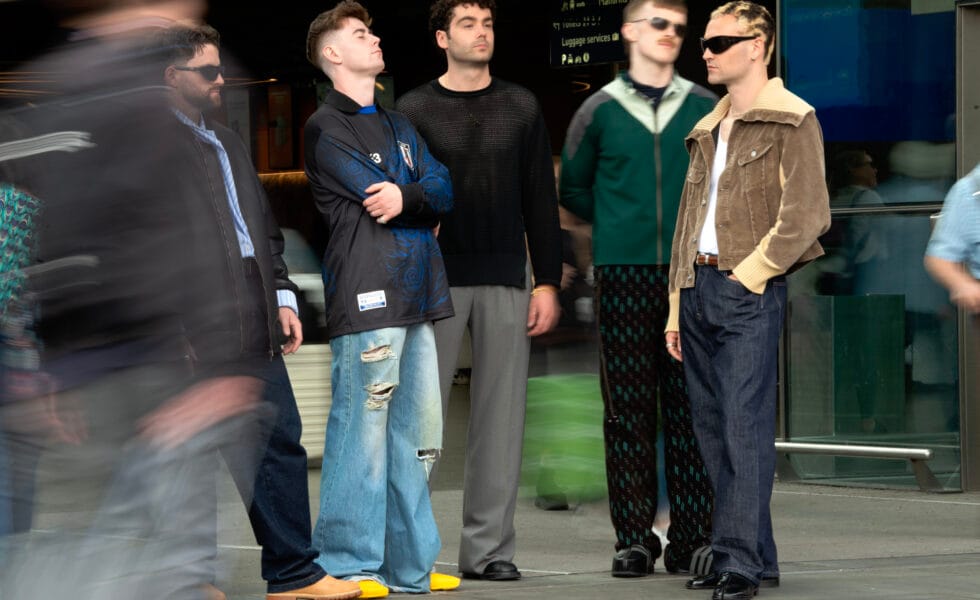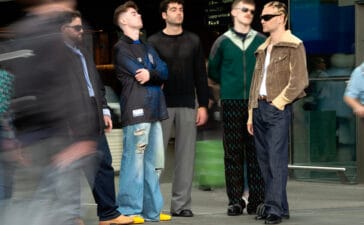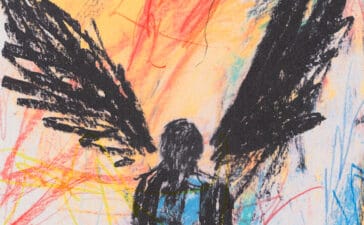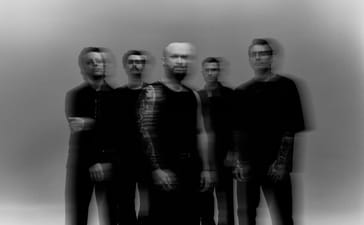Frontman James McGovern talks their first Australian tour, new album Blindness and how they feel about being called ‘post- punk’
The Murder Capital’s James McGovern is effortlessly cool in that way that makes you question everything you thought you knew about cool. It’s not just the way he carries himself; it’s a quiet, inherent charisma that seems untouchable. Like something you could spend your life clawing at and still never come close to.
It’s 9:00am in London. McGovern is calling from his home in Clerkenwell. He’s wearing sunglasses indoors and has leopard print hair. Need I say anymore? I mean, even the mundane image of McGovern having a sip of his morning tea looks cool.
“How are you doing, bud?” His Dublin drawl—both thick and welcoming—settles comfortably into the conversation. There’s a natural warmth to him, one that contrasts with the cooler, more enigmatic image he projects as the frontman of the Murder Capital. I find myself recounting my recent forays into the Irish music scene—gigs by Kneecap, Fontaines D.C.—and waxing poetic about my immersion in the works of Seamus Heaney and James Joyce.
“Shit goes in and out of fashion, but Ireland is fucking cool, man,” he says, a smile practically audible in his voice. “I think we’re one of those countries that, for a native population that’s small, makes a huge impact.”
At that moment, I become acutely aware of my own lack of cool. There I sit, clad in the stereotypical uniform of an Australian—blue linen shorts, Birkenstocks, a half-arsed attempt at a striped short-sleeve shirt—and suddenly, my wardrobe feels like a testament to mediocrity.
But soon, McGovern will be enmeshed in the very same fabric. When the Murder Capital descend upon Australia next month, their sound will merge with the throngs of sunburnt backpackers, their laid-back, almost-too-casual demeanour blending into the culture of tourists. Yet McGovern’s voice betrays no hint of this. His excitement is palpable. “I’m buzzing. None of us have been there before. It’s going to be amazing,” he says, each word wrapped in a giddy anticipation that makes me feel like we’re about to experience something historic.
Of course, McGovern’s trip will not only be about music—it will also be a reunion of sorts. Like many Irish transplants, he has a small army of friends scattered across the Australian coastline. “We’ll get to catch up with a lot of people too,” he mentions casually, and I can’t help but imagine him as a kind of cultural emissary, a bridge between two worlds.
The Murder Capital will be arriving in Australia with their third full length album in tow, namely: Blindness.
At its core, Blindness is a beast—an album that begins in one place and unfurls itself into an entirely different terrain. It is, quite intentionally, a shapeshifter, a record that disorients and reorients, much like the band’s own evolution over the past few years.
McGovern, alongside Damien Tuit and Cathal Roper on guitar, Gabriel Paschal Blake on bass, and Diarmuid Brennan on drums, met while studying at music college. They began crafting music around 2018, and since then, have steadily carved out a space for themselves within a scene that remains ever elusive and slippery. Their sound is an evolving entity, constantly pushing the boundaries of what post-punk can mean.
“It didn’t really have a title when we wrote it,” McGovern explains, as if the very idea of naming the album was secondary to the act of creating it. Unlike their previous two efforts—When I Have Fears and Gigi’s Recovery—this album did not start with a grand conceptual vision. “It was more of a song-to-song thing. After we mixed and mastered it, that’s when we decided to call it Blindness.”
The album is undeniably the Murder Capital’s most ambitious and complex work to date. It tackles not just personal reflection, but wider themes of fractured nationalism and ideological turmoil, at times feeling as if it is surveying the ruins of an entire generation. Yet, at its heart, Blindness is as much about romance—about the disillusionment and yearning of a culture caught between the ancient and the modern—as it is about politics or rebellion. The title, Blindness, serves as a kind of all-encompassing metaphor for the human condition itself. As McGovern puts it, “We’re all tied together by a sense of blindness.”
The album was recorded over three weeks in Los Angeles, with renowned producer John Congleton at the helm. As McGovern reflects, “It all felt like it was bound together by the limitations of our perspective in some way. It’s actually an admission in a way, calling it Blindness. I try not to answer too many questions when writing. It’s about asking the question, creating the space for the listener—and for myself—to ask these questions of themselves.”
In truth, the album’s lyrics are less a pointed critique of individual failings than a collective reckoning. McGovern is keen to stress that it’s not about placing blame, but rather about coming to terms with the shared human experience.
The artwork, too, reflects this ethos. Designed by Viktor H, a Swedish artist and graphic designer, it presents a figure—black, winged, and enigmatic—surrounded by a blur of crayon-colored chaos. It’s childlike in its simplicity, yet disarmingly complex in its execution.
“He [Viktor H] did all the single artworks. It was always informed by lyrical imagery,” McGovern explains. “He started off with this crayon effect, but we didn’t want that for the album. He came back with some other ideas, but they didn’t quite work. Then he came back with this piece, and it proved us wrong.”
What the band loves most about the image is the centrality of the figure, a visual motif that echoes throughout their discography. “It just became this evocative thing. It’s a trilogy,” McGovern muses, referencing the way the imagery has evolved across their previous two albums.
Musically, Blindness is not a record that was directly shaped by influences, yet one constant thread weaves through it all: the music of Lou Reed and the Velvet Underground. “That was it,” McGovern says, his voice punctuating the sentiment. “I just wanted a clear mind.”
Among the tracks, “Swallow” stands out—a hauntingly gentle departure from the band’s usual intensity. Its introspective quality marks a new phase for the band, one in which they explore the slow, often painful process of letting a relationship go before it consumes you.
“That one just formed differently,” McGovern says. “I didn’t like it at first, but over time, each of the band members kept coming around to it. I was the last to crack. It was a real labor of love. There was a lot of friction in bringing that track to the record.”
It’s no surprise that the Murder Capital—along with bands such as Fontaines D.C., Shame, and IDLES—are often bundled into the “post-punk” category. The label, however, doesn’t sit well with McGovern, who approaches it with characteristic disdain.
“I don’t really give a shit if you call us post-punk,” he states, his tone unwavering. “If I had to dig down a bit, I’d say it feels slightly reductive, like it’s not the right genre. The one thing that’s great—or terrible—about our records is that they never really sound the same the whole way through. We’re more like Blur in that way. To say that’s post-punk, fair enough on the first record. But after that? I disagree.”
As our conversation winds to its inevitable close, I offer McGovern one final piece of advice for his upcoming journey to Australia: sunscreen. I’ve spent enough time at Coogee Beach to know that an Irish person’s t-shirt rash can quickly turn into a burn of tragic proportions.
McGovern smiles and nods in response, “Noted, bud.” But the sunglasses still didn’t come off.
The Murder Capital are performing in Wellington, Auckland, Melboure, Brisbane and Sydney from March 31. Tickets can be purchased here.












